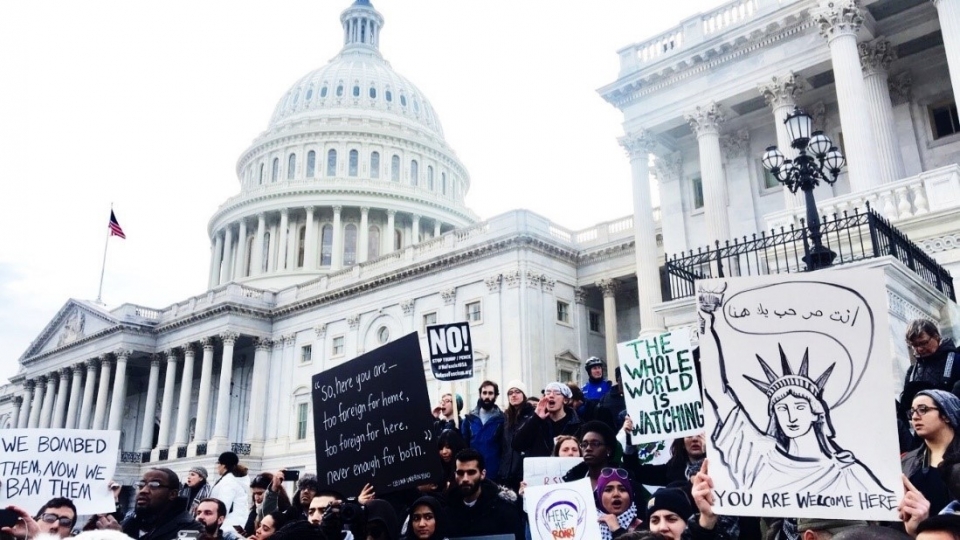
Over the past year, AFSC's Acting in Faith, News & Commentary, and Media Uncovered blogs have explored racial justice, immigrant rights, mass incarceration, and other issues to help people working for social change in their communities, across the country, and around the world. Here are our top 10 most popular blog posts published in 2017:
10. A statement from Cristina, Denver mother who was deported.
"We immigrants are a part of this country. We keep a lot of communities throughout the U.S. going and growing. Like all of you, we all pay taxes, we all work and lead normal, messy, complicated lives. I ask Congress to please make us a priority. We need to stop the deportations that are affecting so many families that have been here their whole lives."
9. When Trump's hate tweets make news, here's what to do.
"Trump’s tweets are dangerous, but so are his administration’s Islamophobic policies, including the Muslim ban and other policies that target Muslim people in the United States and abroad. If you want to weigh in when the president's tweets are breaking news, be sure to focus on the people who are affected by these policies as well as by the president’s endorsement of racist memes."
8. What's at stake for white people in the struggle for racial justice? A conversation with Chris Crass pt. 4.
"For me it’s how do we create opportunities for white people to be both on the right side of history and also to reject this monstrous system that impacts our lives as white people, our communities, our families, the ways that we relate to each other and the ways that we are in the world."
7. A letter to my white sisters after the Women's March.
"Now that you are here, find these veterans of the struggle. If you are able to come with humility, reach out to them, listen to them, don’t expect them to teach you, but learn from their wisdom. Examine your privilege, the way you’ve been socialized not to see. Open your eyes, you are late, but we need you."
6. White People aren't stupid: Note to my white self.
"Systemic racism is not the product of stupid people. The white businessmen who created slavery in America were cunning, smart. The white politicians who justified slavery did so intentionally. Voter suppression, redlining, segregation, the war on drugs and anti-immigrant policies are all creations of intelligent white people. Most white people are not stupid. They are ignorant."
5. Three tips for staying strong when the news is exhausting.
"Read something else. If scrolling through your phone or computer has become a habit, try to channel that energy into something else. If you have been moved lately to become more politically active, seek out readings that will help you be a better activist. AFSC’s Lucy Duncan suggests spending some time listening."
4. Five tips for scholars who want to reach a broader audience.
"To shape the public conversation and change minds, offer solutions or actions people can take to act on what you’ve told them. What do you want people to do when they’ve finished reading your op-ed or blog post or listening to your podcast? What can your research or expertise do to inform a conversation, and how does your contribution help someone think about an issue differently?"
3. Four tips for talking about Trump's Muslim ban.
"Refugees, immigrants, Muslims, are people–regardless of age, regardless of whether they're coming by themselves or with family, regardless of skills or education. The stories of people suffering because of the ban are heartbreaking. By focusing on their stories, we can emphasize the human costs of a horrible policy."
2. Your holiday dinner guest makes an Islamophobic comment. How do you respond?
"So your holiday dinner guest says: “It’s about time America does something to protect us all from terrorists.” In response, you can say, “I totally agree, we should protect people from terror, like those who are fleeing violence and war.” See, you’ve shifted the meaning of who needs protection and what the terror is."
1. A Palestinian Quaker bears witness to pacifism.
"I find violence to be incredibly dangerous. I find it to be impossible to contain. And I find that it cannibalizes communities and I find that it chips away at people's souls. That's why I think adhering to nonviolence is so important, and why for Palestinian Quakers, often without a doubt, there's a cognizance of why that's so essential."
Other popular blog posts:
Although these posts were published before 2017, they remain among our most visited online resources:
Note to self: White people taking part in #BlackLivesMatter protests
"No matter how outraged or indignant you feel, a Black person will still have different feelings. Respect and be present to differences in emotion, experience, and politics. Consider that your role might be as a witness and support to others’ expressions rather than expressing your own feelings."
Art and social change: Five artists with a cultural strategy for change
"For me, the role of artists in social change movements is not to just provide visuals for activists’ communication strategies and immediate needs, but rather to develop what artist Favianna Rodriguez calls a “cultural strategy” to help shift the way people think about the world."